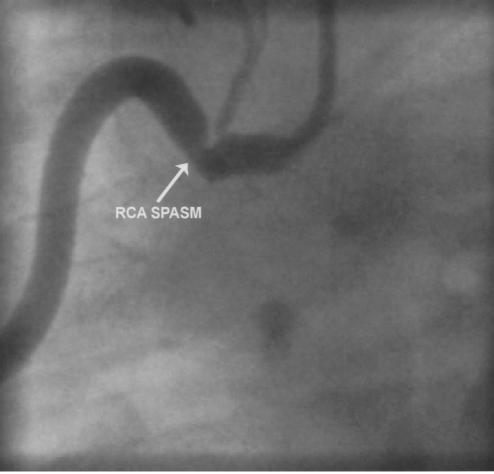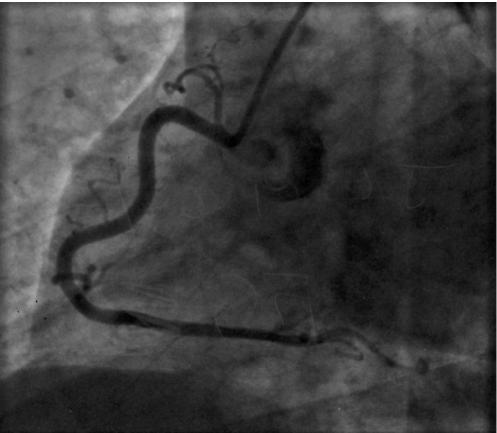Aspirin has been reported to cause coronary spasm as well as bronchospasm, but never acute myocardial infarction.
CASE HISTORY
A woman of 55 attended the emergency department after six hours of left-sided chest pain. She was a smoker. Previously she had been fit and well apart from mild asthma. There was no history of illicit drug use. She did report an 'allergy' to aspirin but was vague about how this showed itself. On examination she was haemodynamically stable and the only finding of note was mild expiratory wheeze. Baseline investigations including oxygen saturations and cardiac enzymes gave normal results; cholesterol was 4.8 mmol/L. Serial 12-lead electrocardiograms showed sinus rhythm and no evidence of ischaemia.
She was initially managed with oxygen and sublingual glyceryl trinitrate, and when this made no difference to her pain she was given intravenous diamorphine. After 10-15 minutes her symptoms had improved but as a precautionary measure the emergency team decided to administer 300 mg aspirin. In the next 20 minutes a florid urticarial rash developed over the patient's entire body surface, she became breathless and she reported central crushing chest pain. The electrocardiogram now showed inferior ST segment elevation of up to 7 mm with associated complete heart block and she was transferred for coronary angiography. Premedication was 200 mg intravenous hydrocortisone and 10 mg chlorphenamine. Gross vasospasm was seen in the left and the right coronary arteries, particularly near the ostium of the right coronary artery (Figure 1). This abated with intracoronary nitrate injections and at the end of the procedure all the arteries appeared normal (Figure 2). Intravascular ultrasound examination of the left and right coronary artery revealed no evidence of atheromatous plaque. She settled on nitrate and calcium channel blocker therapy but measurements of troponin T (0.22 μmol/L) and creatine kinase 1337 u/L twelve hours after the procedure indicated myocardial damage. On echocardiography, inferior hypokinesia was consistent with infarction in the right coronary artery territory. She recovered without incident and was discharged after five days taking the antiplatelet agent clopidogrel. While she was in hospital, relatives provided some information about her aspirin allergy: she had developed a serious rash and been very unwell after taking aspirin in the past.
Figure 1.
Proximal spasm in right coronary artery
Figure 2.
Right coronary artery after intracoronary nitrate
COMMENT
We postulate that the coronary vasospasm and infarction resulted from the aspirin administration. After aspirin, her atypical pain changed to a typical crushing cardiac chest pain, and ischaemic changes developed on the electrocardiogram. Possible mechanisms are coronary artery smooth muscle spasm1 or massive catecholamine release as part of a stress response to the adverse drug reaction. Aspirin-induced coronary vasospasm has been reported previously, leading to exercise induced angina.2 Also, variant angina has been suggested to be aggravated by aspirin.3 In our patient the pain on admission was probably musculoskeletal; there was no evidence of cardiac ischaemia at that time.
There is only one previous report of coronary spasm related to asthma4, and in this the authors suggest a link between bronchospasm and coronary spasm caused by aspirin. With cocaine, spasm leading to myocardial infarction is well recognized5 but we have found no recorded case of aspirin inducing spasm severe enough to cause infarction. Patients who are suspected of having ischaemic chest pain and who report allergy to aspirin should be given an alternative antiplatelet agent such as clopidogrel.
References
- 1.Ramanuja S, Breall JA, Kalaria VG. Approach to 'aspirin allergy' in cardiovascular patients. Circulation 2004;110: e1-e4 [DOI] [PubMed] [Google Scholar]
- 2.Miwa K, Kambara H, Kawai C. Exercise-induced angina provoked by aspirin administration in patients with variant angina. Am J Cardiol 1981;47: 1210-14 [DOI] [PubMed] [Google Scholar]
- 3.Miwa K, Kambara H, Kawai C. Variant angina aggravated by aspirin. Lancet 1979;2: 1382. [DOI] [PubMed] [Google Scholar]
- 4.Habbab MA, Szwed SA, Haft JI. Is coronary arterial spasm part of the aspirin-induced asthma syndrome? Chest 1986;90: 141-3 [DOI] [PubMed] [Google Scholar]
- 5.Kontos MC, Jesse RL, Tatum JL, Ornato JP. Coronary angiographic findings in patients with cocaine-induced chest pain. J Emerg Med 2003;24: 9-13 [DOI] [PubMed] [Google Scholar]




